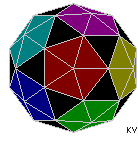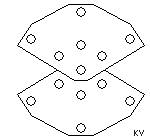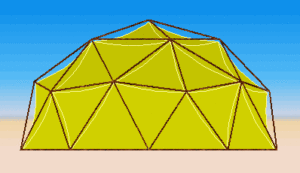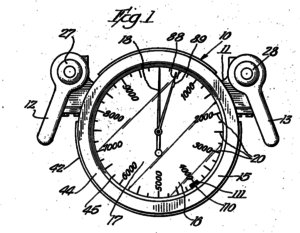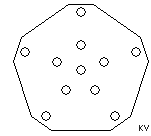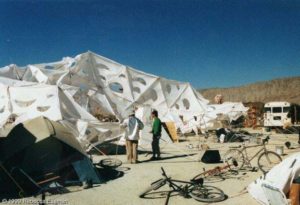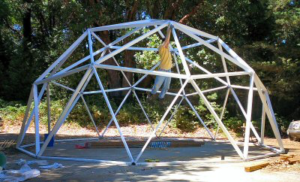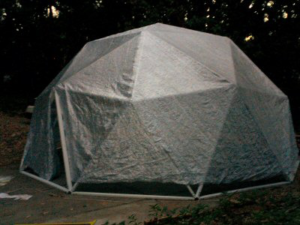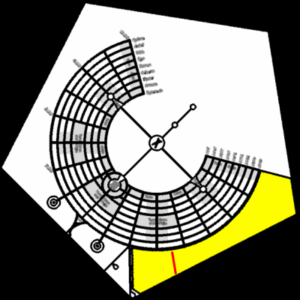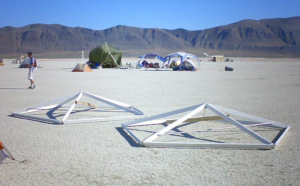Dome
January 1, 2005 by
Every party I’ve been to, everyone stays in the kitchen, even if it’s the smallest room in the house.
This is my “dome-in-the-walk-in-area” project. The idea is to have a comfortable group meeting area at the 2005 Burning Man art festival.… Read the rest
Initial Ruminations
January 1, 2005 by
I’ve been working on this “dome-in-the-walk-in-area” concept, and I think that I have something now.
The idea is to have a nice group walk-in camp. At this camp, I’d like a community meeting area that is out of the sun, dust, wind (and possibly rain), similar in purpose to the dining/meeting tent that I had in Nepal in 1988, but extended to allow room for cooking and general lounging.… Read the rest
Cover Materials
January 2, 2005 by
Aluminized Mylar, gold lamé, and greenhouse shade cloth all have good attributes as cover materials. And they all have their drawbacks.
The question marks show where suspicions need to be confirmed by experimentation.
Shade cloth is the most practical cover solution.… Read the rest
Materials Test
January 8, 2005 by
With all of the talk about tests, it’s time to start planning them.
Edge Strength
I’d like to use ripped 2×4’s instead of 3/4″ EMT conduit or 2″ PVC tubing because 2×4’s are less expensive. My hypothesis is that ripped 2×4’s are stronger than 2″ PVC and 3/4″ EMT.… Read the rest
Coloring the Cover
March 27, 2005 by
I use spreadsheets like Excel for everything. Probably for too many things. I have a 25 megabyte spreadsheet that puts the coordinates of the Earth’s ocean boundaries on an unfolded northern hemisphere.
Click on the image for a really large PDF file that you can print on 11×17 paper and cut out yourself.… Read the rest
Structural Analysis
May 8, 2005 by
Using 2×4s Now
Just how strong does the dome need to be? The largest force on the structure comes from the wind, which at Burning Man, depending on who you listen to, gets up to 30 MPH, with 60 to 75 MPH gusts.… Read the rest
Aerodynamics of Domes
May 10, 2005 by
Update 2018: This post describes aerodynamic estimates that I made in 2005. If I were to redo the anaysis today, I would use the method from more recent projects.
Both airplane wings and domes are curved on top. Should I be concerned with the aerodynamics of domes?… Read the rest
Strengths of Materials (Part 1)
May 12, 2005 by
I find things in unexpected places. On the exhibit floor of the National Association of Broadcasters convention, while walking past the booth of Music Books Plus, I discovered the most amazing and readable book on structural analysis: Structural Design for the Stage (now in its 2nd edition).… Read the rest
How Much Shade Cloth?
May 13, 2005 by
Covering the Dome
Most likely, the dome will be covered with Aluminet shade fabric. This knitted fabric can stretch in one direction but not the other because it contains strings, about 1 cm apart, that run through the fabric with the long dimension.… Read the rest
Strengths of Materials (Part 2)
May 21, 2005 by
Summary
The 2×4s are the dome’s main support, and so here’s an entire (and pretty long) page devoted to them. Perhaps I should summarize the results here:
The 2×4s are sufficiently strong to support the dome in a 60 MPH wind.… Read the rest
Frame is Done!
August 13, 2005 by
Woo, hoo! After assembling the dome’s 25′-diameter frame, Kerry confirms his frame-strength calculations.
Outside and inside views of the dome’s metal brackets.
Looking at the topmost joint.… Read the rest
Cover Half Done!
August 14, 2005 by
On Saturday, Michelle and Craig offered the floor of their home’s big room for marking the shade fabric.
And then . . .
On Sunday, Linda and Chris hosted a “sew-fest.” As Kerry trims the marked fabric pieces, Linda sews.
Follow the plan, and 15 pieces of fabric cover a dome.… Read the rest
Dome with Cover!
August 17, 2005 by
Many thanks to Linda who completed sewing the cover at her and Chris’s place Tuesday night through early Wednesday morning.
Wednesday evening, after transporting the completed cover back to my place, I gathered it into a “donut” . . .
.… Read the rest
Where to Camp?
August 22, 2005 by
The dome will be in the walk-in area, to avoid the noise, congestion, and dust of the main camping area. I’m bringing a 4-foot by 7-foot garden cart to allow easy transportation of equipment from the road to the camp.
But now the question is, just where in the walk-in area should we be?… Read the rest
Dome at Burning Man 2005
September 14, 2005 by
August 30 through September 4
The Wooden 2-by-4 dome starts life as several pentagonal subassemblies. These will tilt up to form walls. A temporary metal brace stabilizes each pentagon, preventing folding as the pentagon is tilted up. Another temporary brace, wooden, and connected to what will become the most vertical member of the pentagon, is folded out after tilting, allowing the pentagon to stand by itself.… Read the rest
